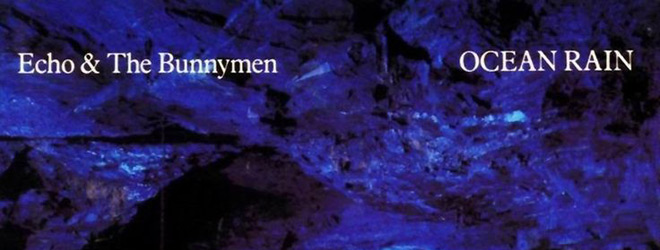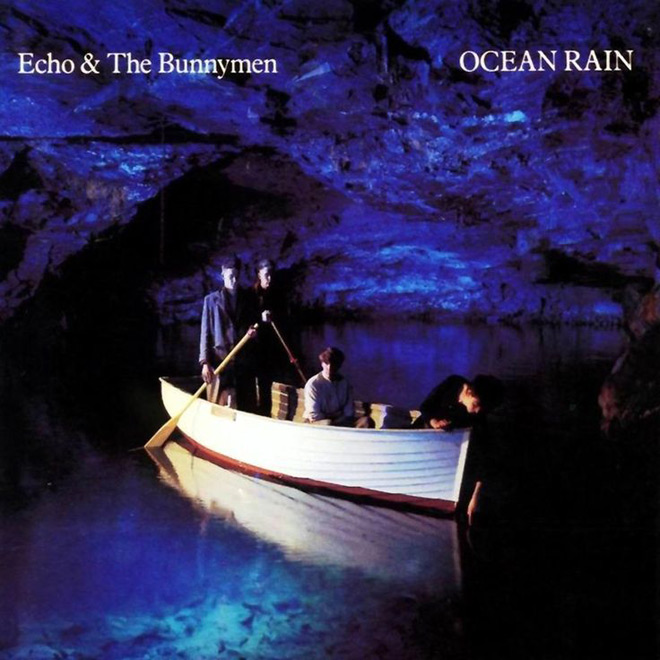The fourth remains their most celebrated album primarily because it was Echo & the Bunnymen at the peak of their sonic glory, when the band that was formed in 1978, in Liverpool, England, still consisted of Ian McCulloch (vocals, guitar), Will Sergeant (lead guitar), Les Pattinson (bass), and Pete de Freitas (drums/percussion).
Released on Friday, May 4th, 1984, via Korova Records, during the heyday of what is regarded now as the ’80s New Wave era, Ocean Rain—Echo & the Bunnymen’s said iconic album—contained some of their first hit singles and the first in which the Bunnymen had maximized instrumentation, employing a 35-piece orchestra.
Ocean Rain opened with its second single, the tidal track “Silver,” whose introductory lush string staccato aptly set the grandiose mood of the entire album—Baroque Pop / New Wave combo at its best. The ensuing track was a delicacy—at 6/8 time signature, “Nocturnal Me” waltzed its dirge-like aural sentiments with utter gloom and claustrophobic solitariness. Then, bursting next with its spectacular sonic splinters was “Crystal Days,” one of Ocean Rain‘s highlights and which strongly connected the album stylistically with the Bunnymen’s Post-Punk roots.
The Bunnymen turned melodramatic again with the slow swagger and sinister sheen of the orchestral beauty “The Yo-Yo Man.” The following “Thorn of Crowns” then picked up the pace and reverberated its added glaze of Eastern-influenced Psychedelia. Playing next now needs no further introduction—the almighty epic “The Killing Moon,” which was what made Echo & the Bunnymen the greatest band in the world, at least according to the unwavering mouthful proclamation of its equally great frontman.
Ocean Rain‘s second single, “Seven Seas” was another track that has become an iconic Bunnymen song—swinging and swaying like chandeliers of diamonds and emeralds, shiny and shimmering like dancing horses and tortoise shells. The penultimate song was now another Post-Punk classic that found the Bunnymen in their most melodic and psychedelic, courtesy especially of McCulloch’s sing-song yelps and Sergeant’s blazing guitar ad-lib.
Finally, McCulloch, Sergeant, Pattinson, and De Freitas concluded their revered masterpiece with the poignant and almost funereal melodrama of the title-track—certainly an apt closer to a thematically cohesive work.
Thirty-five years on, Ocean Rain remains the golden tip of Echo & the Bunnymen’s sonic saber. Played alongside the rest of the band’s prolific discography, it never pales in comparison. Ocean Rain is Bunnymen’s music when they were on the topmost pinnacle of their world.
Now end the decade by paying homage to the entire genre’s 35 years’ throwback by playing Ocean Rain alongside some of its co-alumni, such as Alphaville’s Forever Young, Aztec Camera’s Knife, Big Country’s Steeltown, Cocteau Twins’ Treasure, The Cure’s The Top, Depeche Mode’s Some Great Reward, Fiction Factory’s Throw the Warped Wheel Out, General Public’s All the Rage, Howard Jones’ Human’s Lib, INXS’s The Swing, Lloyd Cole & the Commotions’ Rattlesnakes, Modern English’s Ricochet Days, The Psychedelic Furs’ Mirror Moves, R.E.M.’s Reckoning, Simple Minds’ Sparkle in the Rain, Siouxsie & the Banshees’ Hyaena, Thompson Twins’ Into the Gap, Tones on Tail’s Pop, U2’s The Unforgettable Fire, and Ultravox’s Lament. It is well worth digging into one of Echo & the Bunnymen’s finest album now, again and again.







No comment